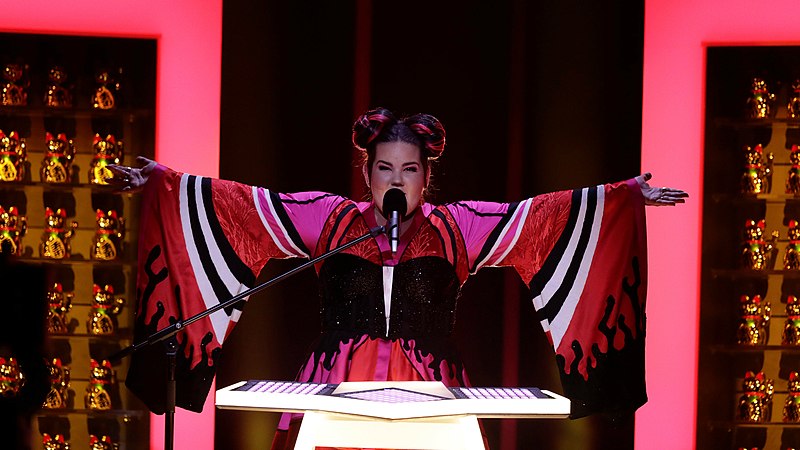5 Reasons People Are Boycotting Eurovision This Year
by Alia Malak
16 May 2019

The Eurovision Song Contest doesn’t usually set off discussions around international law, apartheid and human rights. But with Israel hosting the 2019 competition, this year is different. Calls to boycott the contest came almost as soon as Israel was declared the 2018 winner. Here are five reasons people will be adhering the boycott call and opting not to tune in this year.
1. Eurovision is part of Israel’s ‘brand’ strategy.
It is clear that Israel sees Eurovision as an opportunity to present itself as a tolerant, liberal and fun place. In a July 2018 interview with the Associated Press, Israel’s 2018 Eurovision winner, Netta Barzilai echoed the sentiment, saying, “Israel is amazing. We have amazing people. We are very warm and vibrant, and we have good values…[but] we have such bad [public relations] in the world.”
Of course, Barzilai’s praise would be more palatable if the Gaza Strip had not been under a punishing siege for a decade, with the Palestinians who live there forced to endure a bombing campaign as recently as last week. Or if Israel had not effectively declared itself an apartheid state by adopting the National State Law last year, constitutionally denying Palestinian citizens of Israel the same rights as their Jewish Israeli counterparts.
2. Israel’s human rights record.
According to United Nations (UN) chairperson Santiago Canton, Israeli security forces have committed serious violations of human rights and international humanitarian law. A recent report by the UN found “reasonable grounds to believe that Israeli snipers shot at journalists, health workers, children and persons with disabilities, knowing they were clearly recognizable as such,” it said in a statement. Commissioner Betty Murungi described how an 11-year-old boy was shot while playing football near the fence with Israel. He subsequently had one of his legs amputated.
The discrimination against Palestinians is deeply embedded in Israel’s state structures. Despite the Israeli government making a supposed commitment to allow Eurovision fans to enter the country “regardless of political opinions”, Palestinian fans – whether from the occupied territories or those holding refugee status – are unlikely to be allowed entry to attend the contest.
This refusal to confront Israel’s egregious human rights record for the sake of maintaining the facade that Eurovision is apolitical acts as tacit approval for Israel’s policies of land theft and militarised repression.
3. Culture is political.
When a powerful state like Israel uses culture to show it’s “prettier face” and distract from oppressive practices, we must recognise that culture has been made part of the political agenda.
In the past, Israeli government officials have publicly acknowledged that Israel instrumentalises culture to cover up its grave violations of international law. One official stated “We are seeing culture as a [hasbara] propaganda tool of the first rank, and I do not differentiate between hasbara and culture.” With statements like these, it is clear that there can be no ‘business-as-usual’ when it comes to cultural events being held in Israel.
4. Israel regularly attacks Palestinian culture.
From the plundering and destruction of tens of thousands of Palestinian books back in 1948, to the bombing of the Said al-Meshal cultural centre in Gaza just last year, Israel has conducted relentless attacks on Palestinian culture throughout its history.
As Palestinians, we understand that the targeting of our culture is part of a broader attempt to erase Palestinian memory and identity – that is why music, art and literature are at the forefront of our resistance movements. The protest camps of Gaza’s Great Return March – which has been ongoing for over a year – have incorporated dabke dance groups, traditional Palestinian musicians and reading groups focused on Palestinian and anti-colonial literature.
5. Palestinians have called for a cultural boycott of Israel.
The Palestinian call for a cultural boycott of Israel is part of the call from over 180 Palestinian civil society organisations for the international community to Boycott, Divest and Sanction (BDS) Israel until it complies with its obligations under international law. The campaign to boycott Eurovision is a way to ask people to respect the Palestinian picket line.
Just as it was wrong for musicians to play to segregated audiences in apartheid South Africa’s Sun City, it is wrong for Eurovision contestants to play on the ruins of Palestinian villages, a short drive away from where the people of Gaza endure constant besiegement and brutalisation.
We continue to resist until our dreams of freedom, justice and equality become a reality. The call to boycott Eurovision – as contestants, broadcasters and viewers – is simply an invitation to stand on the right side of history.